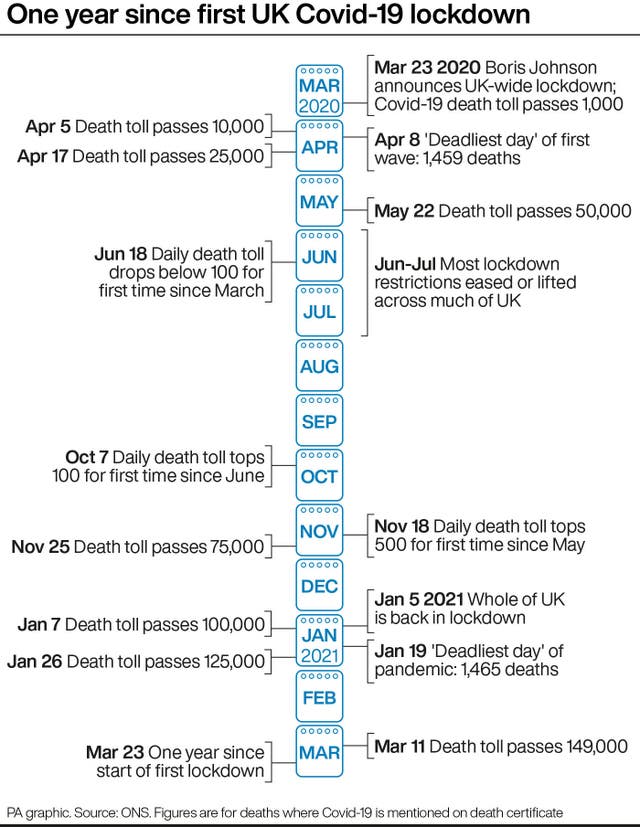PM, Whitty and Vallance reflect on what could have been done differently
The trio cited issues such as data and testing, spread of the virus from Europe and asymptomatic transmission.

Coronavirus transmission from people with no symptoms, testing and spread of infection from Europe were all issues reflected on by the Prime Minister and his top medical and scientific advisers a year on from the first lockdown.
Boris Johnson said the “biggest false assumption” during the pandemic was over asymptomatic transmission and that no previous government had envisioned such a novel disease.
Chief scientific adviser Sir Patrick Vallance and England’s chief medical officer Professor Chris Whitty said better data and testing a year ago would have shown just how serious things were.
The trio, who appeared at the 145th Downing Street press conference since they began being held regularly last March, were all asked what they would have done differently in the past year.
Mr Johnson said: “In retrospect there are probably many things that we wish that we’d known and many things that we wish we’d done differently at the time, in retrospect, because we were fighting a novel disease under very different circumstances than any previous government had imagined.
“The single biggest false assumption that we made was about the potential for asymptomatic transmission and that did govern a lot of policy in the early days, or that misunderstanding about the reality of asymptomatic transmission certainly led to real problems that we then had to work very, very hard to make up ground.”
He said lessons will be learned for future pandemics, when asked whether the Government should have imposed lockdown sooner.
He said there had been “very hard decisions” to make with “no good outcomes either way”, adding that decisions had been taken “with the interest of the British people foremost in our hearts and in an effort to protect the public and prevent death and suffering”.

Sir Patrick said having adequate testing in place at the beginning of the pandemic would have made a “big difference”.
He said: “The one thing that I think would have been really important earlier on is to have much better data on what was happening.
“And that would have required testing to be up and ready immediately and it would have required the ability to get that information into a source and to be able to see it.
“We simply didn’t have that at the beginning and it was very difficult to know the speed at which things were moving and therefore make decisions based on the real-time data which we can do now and that would’ve made a big difference.”
Agreeing with Sir Patrick, Prof Whitty said it was not until people began being admitted to hospital and dying that “we had a really better fix on how fast things were moving”.
He said a lack of testing which also existed in the early stages in European countries had been a factor, as there was “much less of an understanding about how widespread the virus was in Europe”.
He said: “In retrospect we now know the amounts of importation that there were from Spain, from France and from bits of Italy that didn’t obviously have a problem, for example, but at the time we didn’t have that information and that would have almost certainly have led to slightly different approaches to how we did things.”
Mr Johnson warned that the UK must be “very wary” of the potential for a third wave spreading here from Europe, where cases are currently rising.
Asked about the potential for hotel quarantine for “absolutely everybody” arriving into the UK, he ruled nothing out.
He said: “I want to be clear with the public – we keep all these measures under review.
“In so far as it’s necessary to take extra measures to protect this country against new variants, variants of concern, of course we’re going to do that.”
Prof Whitty said the second wave of coronavirus “would’ve been very different” with the height of the peak “a lot lower” if it was not for the new more transmissible variant which was detected before Christmas.
“That has completely taken over in the UK and that is now the variant,” he said.





